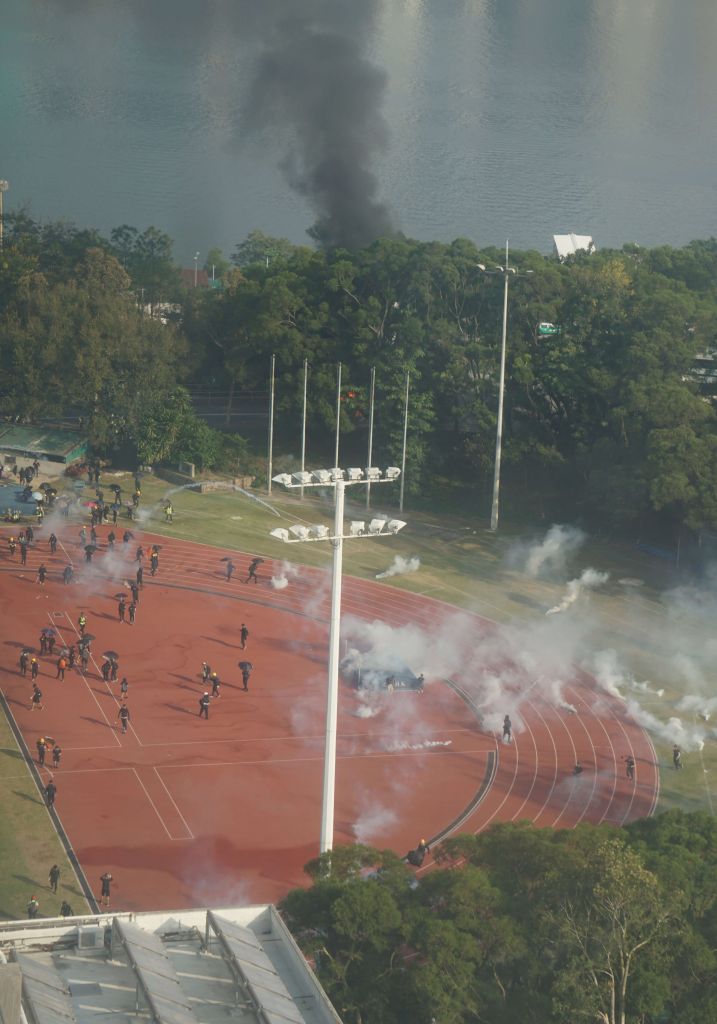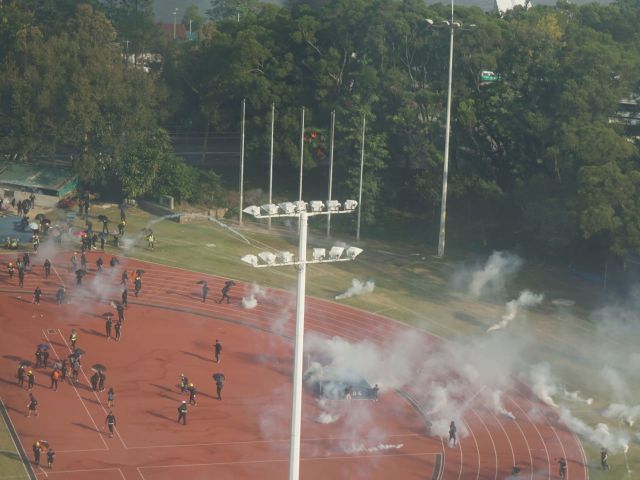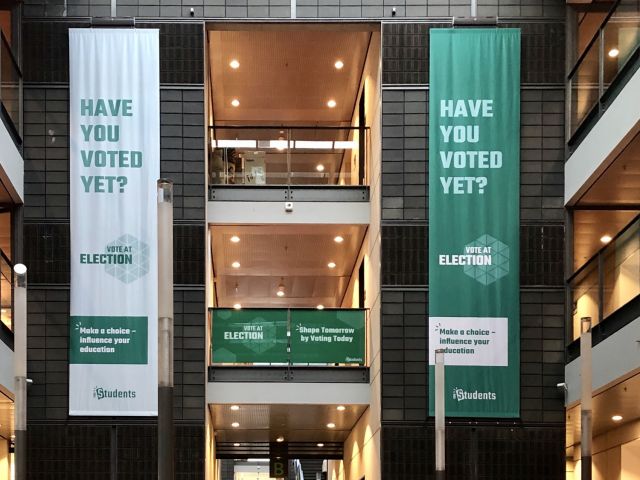CBS answers criticism from students trapped in protest-stricken Hong Kong

The demonstrators dug up cobblestones to use as missiles. (Photo: Johan Schack Petersen)
Two CBS students required more support from CBS when their university became a battleground. CBS argues that it is doing what it can for its students in Hong Kong, and although there is now no academic reason to stay in Hong Kong, CBS does not consider students under obligation to return home.
Thursday last week, 49 CBS students in Hong Kong received a message from CBS asking them to follow the official travel and security advice from the Foreign Ministry of Denmark. This included staying away from the demonstrations and following the instructions from the local authorities. CBS had also initiated the option for local help from the Danish Chamber of Commerce in Hong Kong, and it was emphasized that the students should contact the International Office in case of problems and concerns.
However, five CBS students were caught in the eye of the storm, as their university, Chinese University of Hong Kong (CUHK), suddenly became a battleground as demonstrators and the police clashed. And two of the CBS students we have talked to felt they were left to themselves needing clearer guidance from CBS.
“We felt we had to take care of everything ourselves in the middle of something resembling a war zone without any help. The Technical University of Denmark reached out to its students and asked them to return home, and it would have been helpful if CBS had said the same,” says Johan Schack Petersen, who is studying for a BSc in Business Administration and Project Management at CBS and is one of the five students at CUHK.
CBS’ Vice Dean of International Education, Martin Jes Iversen, explains that CBS is doing what it can to help the students in need.
“Before the riots escalated, CBS had 49 students divided among six universities in Hong Kong. We have followed the situation closely and updated all our students. We have also done what we could to establish contact with people who could help our students. For example, we contacted the Danish Chamber of Commerce in Hong Kong and they were willing to help our students,” he says and continues:
“Also, we have encouraged our students to contact our International Office to solve the problems they have unintentionally been caught up in,” he says.
The students received a total of three emails from CBS between Thursday and Saturday last week explaining how to deal with the demonstrations and the fact that many of the have universities decided to stop teaching for the rest of the year.
The email from Saturday stated “there is no longer any academic reason to stay in Hong Kong this semester. If you decide to stay in Hong Kong anyway, we advise you to follow the travel guidelines. (…) In case you feel uncertain or insecure, we advise you to travel home to Denmark.”

Johan Schack Petersen and Gustav Fog from CBS tell about their firsthand experiences with the Hong Kong protests as they spread to their university. (Photo: Johan Schack Petersen)
When asked why CBS has not called home its students like the Technical University of Denmark, Martin Jes Iversen says:
“It is CBS’ policy to follow the travel and security advice from the Ministry of Foreign Affairs, which is also the case for the other Danish universities – in this case except DTU though. The ministry hasn’t advised against Danes staying in Hong Kong. The students have been able to contact us all the time and we are here to offer concrete help.”
He continues:
“It’s obvious that you feel insecure if you end up in the middle of riots as violent as the ones we have seen on TV over the past few weeks. It is therefore of the utmost importance to follow the statements from the Ministry of Foreign Affairs closely and approach the authorities for help if necessary.”
Did CBS do enough?
CBS sends hundreds of students off on exchange trips every year, so doesn’t CBS have a responsibility to secure the safety of its students when they are abroad?
“We have a responsibility to make sure that our students’ exchange trips take place under orderly conditions. This entails that we only collaborate with accredited and recognized universities in what we see as traditionally safe countries and regions,” he says and continues:
“For example, we only have very few exchange agreements in the Middle East and Africa. Until very recently, Hong Kong has been one of the most peaceful countries, so developments can be very fast and unforeseen.”
Johan Schack Petersen explains that exchange students from Italy and Japan were picked up by authorities from the embassies, and that students from the U.S. were requested to leave Hong Kong and had their flight tickets paid for.
CBS is offering its students the chance to apply for DKK 5,000 to cover the expenses of coming home early. But is DKK 5,000 enough?
“In our opinion, as well as the University of Copenhagen’s, DKK 5,000 is a suitable amount,” says Martin Jes Iversen.
Since many of the universities based in Hong Kong, including CUHK, have chosen to close for the rest of the year, many students did not manage to finish all their courses and take their final exams. At the moment, the universities and CBS are, according to CBS, in the middle of figuring out how the students can finish the courses and exams in Denmark.
Has CBS done enough to help its students in Hong Kong?
“It’s a big question to answer when you are safe and sound and far from the riots. As we see it, our first priority has been to find local help, so that our students weren’t all alone in Hong Kong. Besides the help from the authorities, Danish businesspeople from the Danish Chamber of Commerce offered their help, for which we are grateful. Next on the list is finding solutions to the interrupted studies,” says Martin Jes Iversen.




































































































































Comments